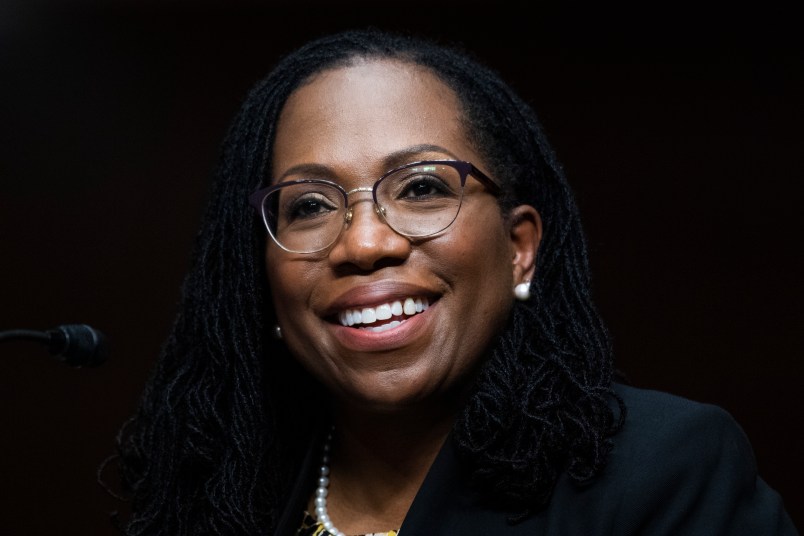Ketanji Brown Jackson was confirmed to the U.S. Court of Appeals for the D.C. Circuit Monday evening, replacing now-Attorney General Merrick Garland and positioning her well for a potential future Supreme Court nomination.
The vote hewed closely to party lines, 53 to 44, with a few members missing the vote. Only three Republicans, Sens. Lindsay Graham (R-SC), Lisa Murkowski (R-AK) and Susan Collins (R-ME) voted with the Democrats to confirm her. The close confirmation was presaged by a procedural vote to invoke cloture on the nomination last week, when just the same three Republicans crossed the aisle.
The tight margin for the Jackson votes, despite her qualifications, is an indication of Republicans’ reluctance to vote for President Joe Biden’s Supreme Court nominees. Jackson has long been considered a likely future pick, and Biden pledged to nominate a Black woman if he gets the chance. At 50, Jackson is also young by Supreme Court standards, making her an attractive choice.
But indications of the trouble Biden would have garnering Republican support for a future SCOTUS pick solidified Monday, when Senate Minority Leader Mitch McConnell (R-KY) said candidly on a radio show that it’s “highly unlikely” he’d allow Biden to fill an open Supreme Court vacancy in 2024, if he was majority leader by then. He wouldn’t even commit to letting Biden fill one as early as 2023, if Republicans have regained the Senate majority after the midterms.
While his stance should come as little surprise — McConnell made clear with Justice Amy Coney Barrett’s nomination that his blocking of Merrick Garland’s nomination under former President Barack Obama had nothing to do with timing, and everything to do with power — it’s added fuel to the fire of liberals calling for Justice Stephen Breyer to retire while Democrats still have the Senate. Thanks to McConnell’s own hacking away at the filibuster, Supreme Court nominees can be confirmed with a simple majority.
Breyer, age 82, has given no indication so far that he intends to retire at the end of this term. Liberals, still burned by the death of Justice Ruth Bader Ginsburg after she refused to retire when Obama had a Senate majority, are growing increasingly worried that Breyer’s reticence will ultimately lose them another seat. McConnell’s comments have made it clear that Breyer’s window to retire and be replaced by Jackson, or another young judge, could be brief and fleeting. Jackson, incidentally, once clerked for Breyer.
Ginsburg said that she had no desire to retire while she was operating at “full steam,” since she doubted that the Senate would be able to confirm anyone as liberal as she was. Breyer has indicated that he doesn’t want to contribute to the politicization of the Court with a calculated retirement — a rationale bemoaned by Democrats living in fear of his untimely death and a 7-2 conservative Supreme Court.







Man, she looks closer to 30 than 50.
Justice Jackson, if you’re nasty.
So Breyer doesn’t want to politicize the court by timing his retirement. How noble of him.
And how horribly selfish, foolish and short-sighted. Does he actually think Republicans will give a damn about his aspirations if given the opportunity to replace him?
For many years (decades, actually) I didn’t buy into the idea that those in the upper echelon of federal politics, of which court justices are a part whether or not they acknowledge it, lived in rarified air, unable to understand the concerns of ordinary citizens. But reports like this are changing my mind faster than lightning.
“…before shooting a cute, little puppy – just to watch it die – and laughing maniacally.”
The trick is to use all those magic facial creams made from unicorn dust and rainbow dew, but not stay up late enough to watch the infomercials.